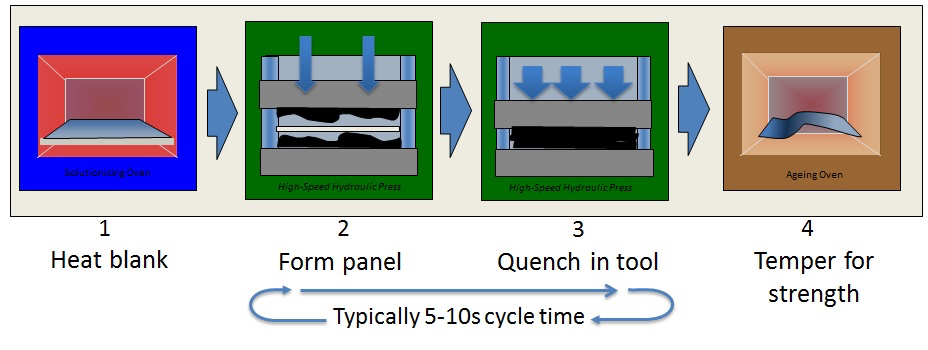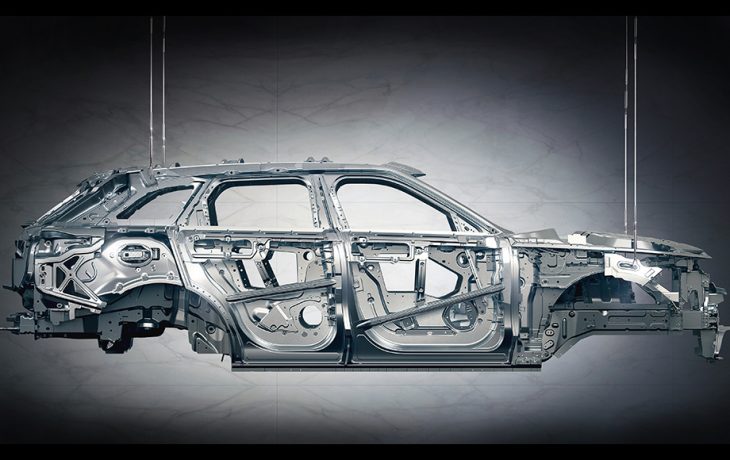The Rapid Aluminium Cost Effective Forming (RACEForm) Project, a consortium of industry and academic partners lead by Impression Technologies, has been awarded funding through the Advanced Propulsion Centre UK Ltd. (APC) to further develop and validate Impression Technologies’ hot form quench (HFQ®) Technology for use in the global automotive industry. The total project value is £9.5 million, with £4.8 million in funding through the APC, awarded as part of its seventh round of funding.
“We are delighted that APC has chosen to back our HFQ Technology,” said Jonathan Watkins, Impression Technologies’ chief executive officer. “We look forward to working together with Gestamp and the other consortium members in collaboration with our OEM and aluminum partners to further develop the HFQ Technology for mass production and to establish the technology as a global industry standard.”
HFQ Technology
Developed by Impression Technologies, the HFQ Technology is a production method for stamping complex-shaped aluminum components from high-strength and ultra-high-strength alloys. The pressing/deep drawing process allows for complex shapes to be made from a sheet of metal while retaining the full mechanical properties of the alloy. The technology offers OEMs significant savings in weight, cost, and system complexity through its ability to produce deep drawn high strength aluminum alloys with low cycle times and no spring back.

“The HFQ process involves forming a heated aluminum sheet and then quenching it when it’s being pressed into the required shape. Scaling up this technology for high volume implementation is very exciting,” said Dr. Roger Darlington, BCAST’s director of Technology. “Among the many benefits of this technology, the door that it unlocks is the potential to form very complex pressed parts using high strength aluminum alloys that would otherwise be infeasible. The technology also brings benefits from the elimination of component spring back during stamping, and it opens new design opportunities for vehicle designers and architects, such as slimmer structural pillars.”
The RACEForm Project
The RACEForm project consists of a consortium of companies comprising of Impression Technologies, Gestamp Washington UK Limited (a wholly owned subsidiary of Gestamp Automoción), Innoval Technology Limited, Imperial College London, and the Brunel Centre for Advanced Solidification Technology (BCAST) based at Brunel University London. The consortium will also work in partnership with a major UK-based passenger car OEM and an aluminum sheet producer.
The focus of the 30-month RACEForm project, which started in November 2017, will be on validating the HFQ Technology for the mass production of complex, deep drawn, high strength aluminum structures for body-in-white and chassis applications and help establish the technology as a global standard for aluminum light-weighting worldwide. The RACEForm project will help position the U.K. as a leader in aluminum light-weighting and establish a strong U.K. supply chain capability for the development of low cost, mass production low emission vehicles.
Gestamp Automoción, a global leader in the design, development and manufacture of metal components for the automotive sector, will be working with Impression Technologies to achieve safer, lighter and more efficient vehicles using HFQ Technology. “Gestamp is continuously innovating in product and process and material developments and sees HFQ as an important milestone in developing advanced technological parts for application on future OEM platforms,” said Tom Larsen, manager of R&D Advanced Technology & Application at Gestamp.
BCAST’s principal role within the project will be the exploration of sheet manufacture from recycled sources, which presents an opportunity to reduce whole vehicle lifecycle emissions. Recycled sources of sheet aluminum represent a 95% savings in CO2 emissions over sheets from primary aluminum sources and the HFQ process presents a major enabler to further unlock potential CO2 savings derived from recycling aluminum alloys from scrap sources such as end-of-life vehicles.

